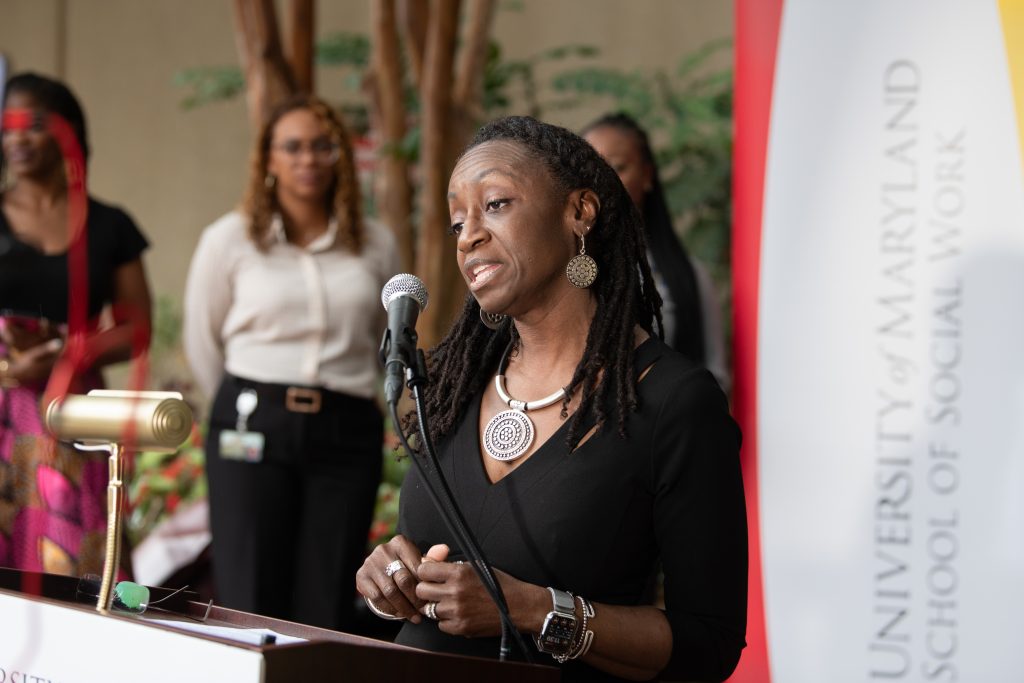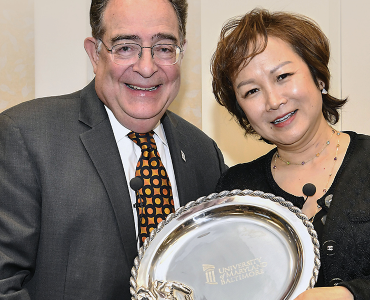
The University of Maryland School of Social Work’s (UMSSW) Center for Restorative Change is poised to revolutionize school-based mental health services with a $5.5 million grant from the U.S. Department of Education that will significantly expand the training of mental health service providers in high-need school districts across Central Maryland.
The University of Maryland, Baltimore’s (UMB) Fellowship for School-Based Mental Health serves as a conduit for nurturing and developing the next generation of social work professionals and placing them directly within Maryland schools to provide top-tier mental health support to students and their families.
“It is of paramount importance that we cultivate and empower the next generation of school-based mental health service providers,” said UMSSW Dean Judy L. Postmus, PhD, ACSW. “Through this program, in collaboration with esteemed partners across the state, we will ensure the provision of top-tier training and amplify accessibility and affordability for future students, especially students of color. This initiative comes at a crucial time when we are confronted with a pressing shortage of experts in this pivotal field.”
With the support of multiple schools and entities, the program aims to serve six local educational agencies, hire 50 providers, and reach 10,000 students. It prioritizes targeted training for social work students, equipping them with the skills necessary to meet the diverse needs of students in these communities.
During the school year, schools will have a robust network of trained mental health professionals ready to provide crucial support. This school year will not just be about academic growth, but also about fostering emotional well-being, resilience, and mental health among students.
“With proper funding, we expect that schools will feed children healthy meals, provide opportunities for socio-emotional development through arts and after-school programming, and deliver developmentally appropriate curricula,” said Ariya Hayes-Lawson, a UMSSW student and program fellow. “Given the impacts of the pandemic on children’s academic proficiency and mental well-being, it should follow that their mental health needs also be met within schools.”
Addressing Lack of Diversity
This forward-thinking program also strives to address the lack of diversity in the field of social work. Recent research shows that 63 percent of new social workers are white. With this in mind, the project aims to break down barriers for people of color who may lack resources to pursue their social work education, thereby enhancing diversity among highly qualified trained mental health providers.
“The greatest barrier for most prospective students of color to attending graduate school is financial,” said Wendy Shaia, EdD, MSW, executive director of the Center for Restorative Change and principal investigator for the grant. “Another big barrier for social workers of color is passing the social work licensing exams, which have demonstrated huge racial disparities — not because exam takers are unprepared, but because the test is deeply flawed. This fellowship will support students in overcoming both of those barriers.”
The COVID-19 pandemic underscored the urgent need for quality mental health providers in schools, with nearly 143,000 children in Maryland developing anxiety and/or depression due to the crisis. This project also aims to mitigate this issue by increasing the number of trained service providers.
Making a Difference to Children
In collaboration with Coppin State University and the University of Maryland, Baltimore County (UMBC), the center will spearhead the recruitment, training, and development of 105 social work students per year. These students will mirror the diverse backgrounds of those in UMSSW’s partner schools, ensuring an inclusive approach to mental health service provision.
“We are excited to be able to provide our baccalaureate social work students this opportunity to receive training and experience with in-school social work,” said Shelly A. Wiechelt, PhD, LCSW-C, associate dean and chair of social work at UMBC. “They will be prepared to advance their skills further in the MSW [Master of Social Work] program. Ultimately, they will become part of the school social worker workforce and will make a difference in the mental health of children and adolescents.”
The UMB Fellowship for School-Based Mental Health offers a unique professional pathway for students interested in school-based mental health services, providing stipends from the Bachelor of Social Work degree through the MSW degree.
“I anticipate this grant will be beneficial not only financially, which will allow me the freedom to use my time developing my clinical skills, but also providing opportunities for hands-on learning,” said Faith Rogers, a social work student at Coppin State University. “I believe the mission of this grant aligns with my career goal to provide culturally responsive access to mental health care for African American youth.”



